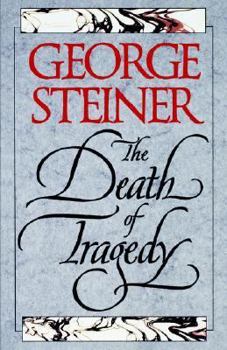The Death of Tragedy
Select Format
Select Condition 
Book Overview
"This book is important--and portentous--for if it is true that tragedy is dead, we face a vital cultural loss. . . . The book is bound to start controversy. . . . The very passion and insight with which he writes about the tragedies that have moved him prove that the vision still lives and that words can still enlighten and reveal."--R.B. Sewall, New York Times Book Review "A remarkable achievement. . . . The knowledge is...
Format:Paperback
Language:English
ISBN:0300069162
ISBN13:9780300069167
Release Date:October 1996
Publisher:Yale University Press
Length:382 Pages
Weight:1.00 lbs.
Dimensions:1.1" x 5.3" x 8.2"
Customer Reviews
3 ratings
Dazzling essay !
Published by Thriftbooks.com User , 20 years ago
The tragedy has lost its real dimension in the modern times . The triviality understood as the absence of psychic tensions. We hardly are capable to experience this state due we have found the immediate solution : the therapy , and any other way of easy activity allows us to escape . We want to know about our micro destinies reading the horoscopes . In the other hand all the religions have confined its real meaning to spiritual designs and literally has invaded its territories . Shakespeare appears after centuries of silence in this sense . But the XVII century was a trivial century ; you only find cynicism and tedious. "All the men have conscience of the tragedy in the life but the tragedy as theatrical way is not universal" Steiner makes an intelligent study about the tragedy ,and goes far beyond . Excellent text all the way.
What is begotten , born and dies
Published by Thriftbooks.com User , 20 years ago
Steiner argues that Tragedy is an Artform unique to the Western world. In his opening pages he makes the claim that for the Judaic sensibility there is no tragedy as it is " vehement in its conviction that the order of the universe and of man's estate is accessible to reason."pp.4 For Steiner tragedy arises out of a contrary view"necessity is blind and man's encounter with it shall rob him of his eyes, whether in Thebes or in Gaza."pp.5 For Steiner this is a Greek assertion.Steiner makes a learned survey of Western Literature showing the points at where tragic genius has flourished, and the many more where it has been attempted and failed. Close to the end of the work he makes this observation "..tragedy is that form of art which requires the intolerable burden of God's presence. It is now dead because His shadow no longer falls upon us as it fell on Agamemnon or Macbeth or Athalie. " Steiner then goes on to talk briefly about the possibility of renewal of tragedy under different circumstances. This work is a stellar piece of literary criticism- whether one takes issue with Steiner and believes Job on the one hand , and Willy Loman in another way , are tragic characters after all.
Fate of the tragical
Published by Thriftbooks.com User , 23 years ago
If you have ever sat down with quill pen to attempt a blank verse tragedy, only to tear up your notes, this is the book for you. Tragedy as a genre remains the rara avis in the history of art, and its brief appearances seem to accompany periods of history going into high gear. Its reappearance in the early modern, followed by its steady decline in modernist amnesia, is a challenge to our basic conceptions of the technological quick fix, and the presumption our potential is open to our rational powers. Steiner reviews the enigma of this history, on and off, and focusses on the 'death' of the genre in more recent modern times, cataloguing the consistent string of failures even in many of the best later poets, from Dryden to Keats. Some might disagree with the verdict, yet one must confront the facts, which cannot, however, condemn us to the final demise of this artform, since its very history shows its sudden and unexpected rebirth. Yet the whole question is bound in some primordial evolution of language and its poetics, as these seem better tilled soil at the beginning than over the course of subsequent development, witness the richness of the first source, Homer's Iliad, the master chord from which the tragical melody sounds its echoes.





